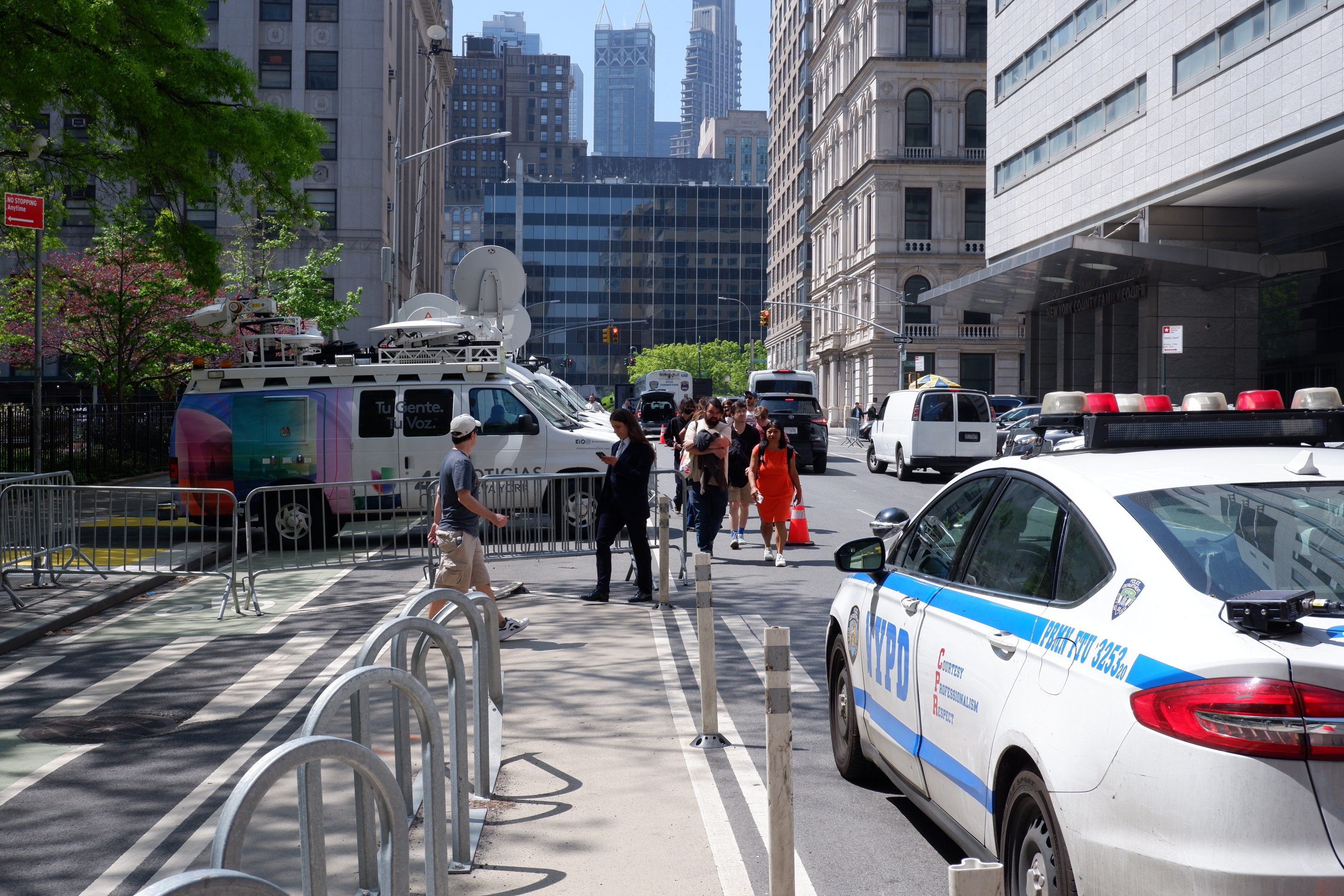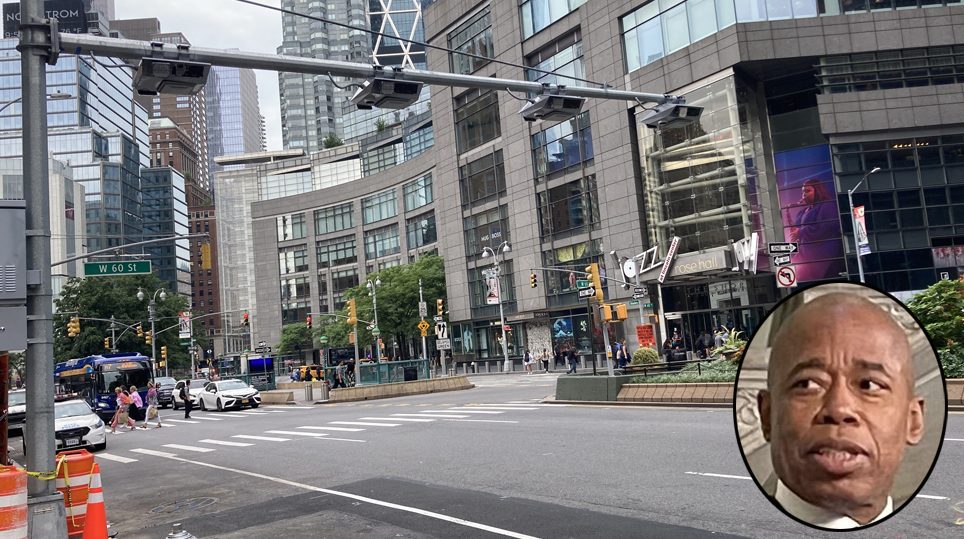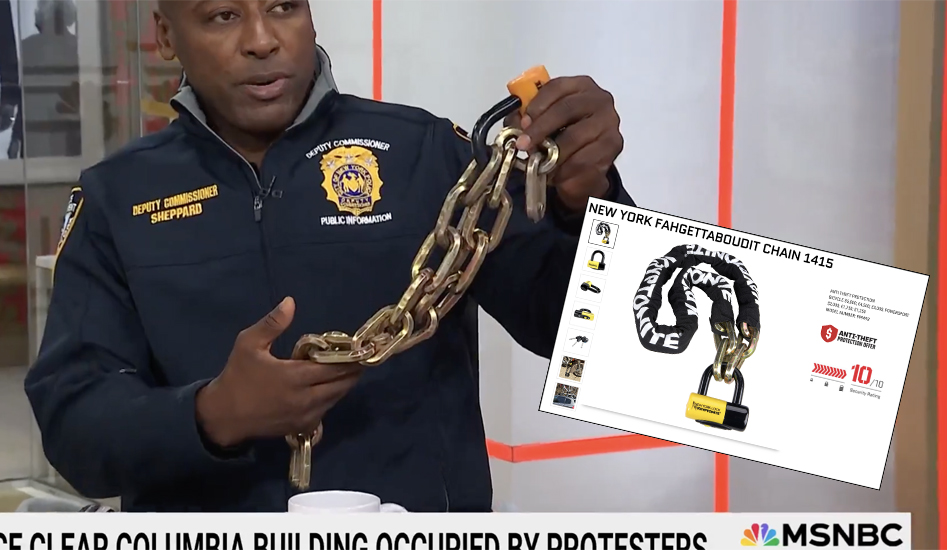FAKE COMPROMISE: The 34th Avenue Open Street Fight is About Entitlement and Grievance
1:36 PM EDT on May 21, 2021
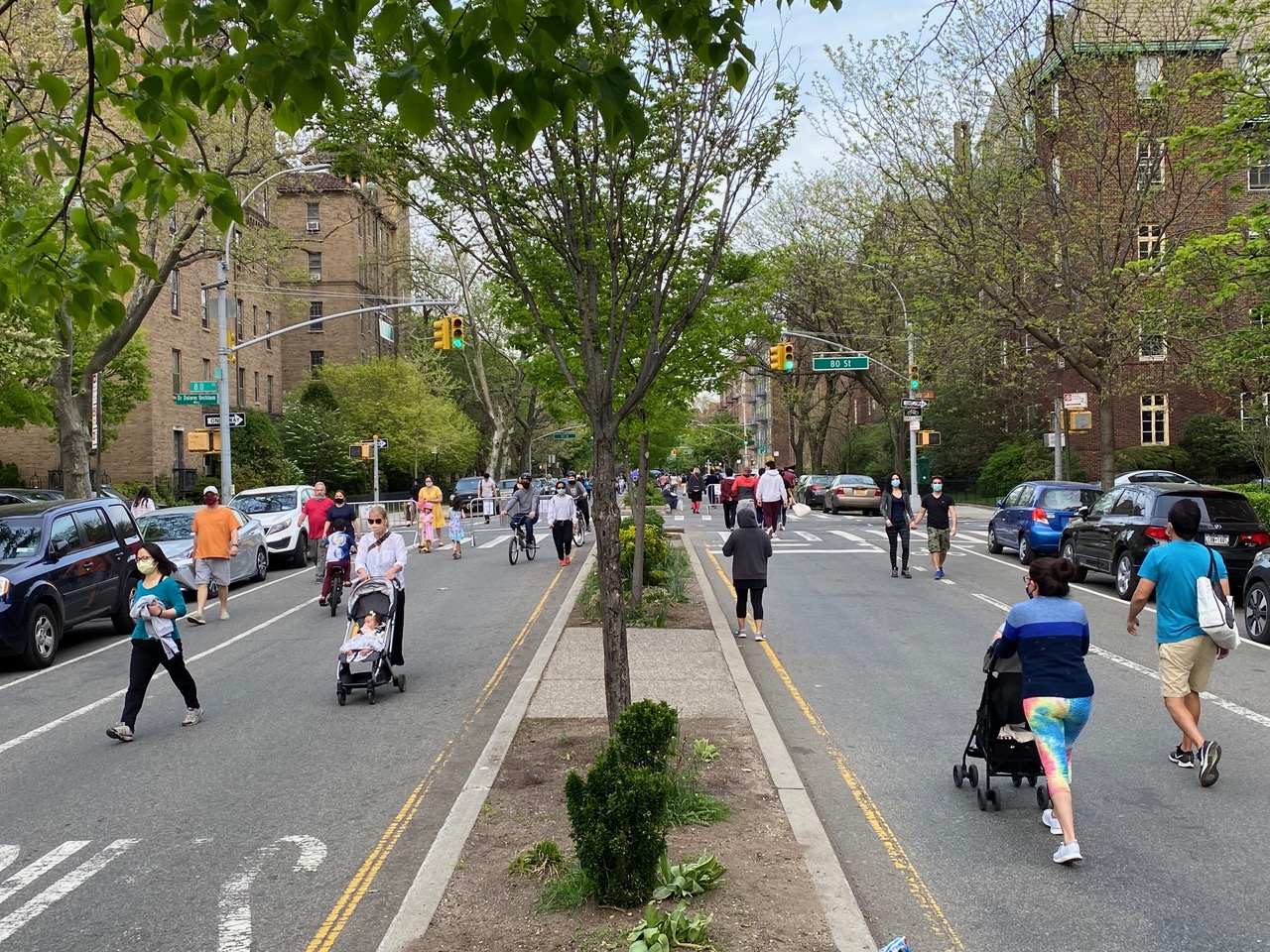
The 34th Avenue Open Street. File photo: Clarence Eckerson Jr.
What are they fighting for? Why, cars, of course.
On Saturday afternoon, members of a group that wants to reduce the hours or days of the 34th Avenue open street in Jackson Heights — or eliminate it entirely — will rally on the open street to complain about it. The group consistently claims it is not opposed to the open street, but it has spent the last two months demanding that it be reduced — and the group's methods include berating Department of Transportation officials in hopes that they will water down their plan for the roadway before it is presented next month.
"Nobody asked me my opinion!" one man screamed after interrupting other members of the opposition group at a recent meeting when he clearly didn't think they were being aggressive enough. He then made a series of verifiably inaccurate, racist and nativist assertions that seemed to be based strictly on his gut reactions. (A video snippet of his enraged, entitled rant is here.)
The larger group has made a number of outrageous claims — and its members have harassed and verbally assaulted supporters of converting the roadway into a linear park, and mischaracterized that group's petition, which is a true compromise in that it seeks to take a single roadway, in a neighborhood with scores of them, away from cars. And the so-called compromise group has claimed it has the support of neighborhoods groups that it does not, in fact, have. (The Jackson Heights Beautification Group had to go so far as to issue a public statement after the anti-open street group claimed its backing.)
The so-called "compromise" group also has members who post things like this on a public Jackson Heights Facebook page, revealing that their compromise is not a compromise at all, but a bid to turn something from an 84-hour-per-week neighborhood resource between Junction Boulevard and 69th Street into something as little as six hours over far less a distance:

So let's be clear about what this is all about:
The battle over 34th Avenue is one of entitlement. Census data show that residents who own cars in the greater Jackson Heights and Corona area — comprised by Community Board 3 — are far wealthier than their non-car-owning neighbors.
According to the Census, the median income of a household without a car is $42,761, or roughly $25,000 less than the neighborhood's median income. Households that own one car have a median income roughly 60 percent higher, or $68,214. And households with two cars have median incomes that are 170 percent higher than the non-car owners, or $115,140.
Here's what that looks like in a chart prepared by BetaNYC exclusively for Streetsblog:
As volunteers supporting a permanent park-like vision for the open streets have collected signatures on their petition, it is clear that many residents do truly understand that the so-called "compromise" group is offering no such thing to a neighborhood that has among the lowest — or in fact the lowest, depending on how you calculate it — amount of public green space. The "compromise" group's petition does not actually seek anything, but merely provides a laundry list of "issues" that "could make the situation better for everyone" (the implication is that "everyone" thinks "the situation" is currently bad because there has been a tiny amount of inconvenience to the wealthy car owners, plus some additional trash from the fact that so many people are using the open street).
In fact, the 34th Avenue open street has been almost universally lauded as the model of what New York City needs to do — and, is in fact, now mandated to do by law — with its permanent open street program. Multiple DOT officials have called 34th Avenue "the gold standard" of what an open street should be: popular, frequently used, well-programmed, safe (because of the absence of cars). DOT Commissioner Hank Gutman recently visited the roadway during the 8 a.m.-to-8 p.m. open street hours and pronounced it "the crown jewel" of the program.
And, more important, the 34th Avenue open street has earned the broad support of the borough president, the neighborhood's Assembly member and Council member, one of the candidates to succeed that Council member, and every day residents — all of whom have penned op-eds for Streetsblog.
And in an interview with Streetsblog on Friday, one day before the fake compromise rally, mayoral candidate Kathryn Garcia reiterated her support for the open street — and her strong opposition to the "compromise" of reducing its hours or days or length.
“Thirty-fourth Avenue is lovely; it really is a community amenity now," she said. "You see little kids on roller skates, kids on bikes, particularly in an area that has so little access to recreational activity. It's is the right direction for us to be going in. ... I want it permanent. I like having it closed to traffic, open to people all the time. That is the direction we want. I would not reduce their hours, I think it’s been incredibly successful."
She agreed that some of Mayor de Blasio's open streets are not as effective because fewer people use them, but that's not the case on 34th Avenue, thanks to a massive volunteer effort, as Streetfilms has reported.
"The ones I’d want to look at again is where no one’s using it, but that’s not true on 34th Avenue," said Garcia, who recently visited the area by bike with Streetsblog's Dave Colon. "You see families, older people, I think it’s been very successful for that community.”
Most notably missing from the list of political supporters is State Senator Jessica Ramos. Last year, Ramos sat in the middle of the open street and told Streetsblog that she wanted it to be a 24-7 open street. More recently, however, she has been using the term "compromise" to describe her vision for the open street — but she has declined repeated interview requests from Streetsblog. She has expressed vague concerns that a linear park could lead to gentrification — a notion that has been dismissed as a smokescreen to appease the car-centric anti-open street group. The specter of gentrification was dismissed by a prominent housing and civil rights activist in the neighborhood — especially in the context of historically racist planning decisions that created some of the conditions that make the open street so important (many of the wealthier residents of Jackson Heights, for example, live in buildings with lush, private inner courtyards, so those residents' need for open space is limited. The median on 34th Avenue was narrowed to make room for more cars decades ago, another loss of green space in favor of pollution-spewing cars).
And who supports open streets? People who need open space in a neighborhood with too little of it.
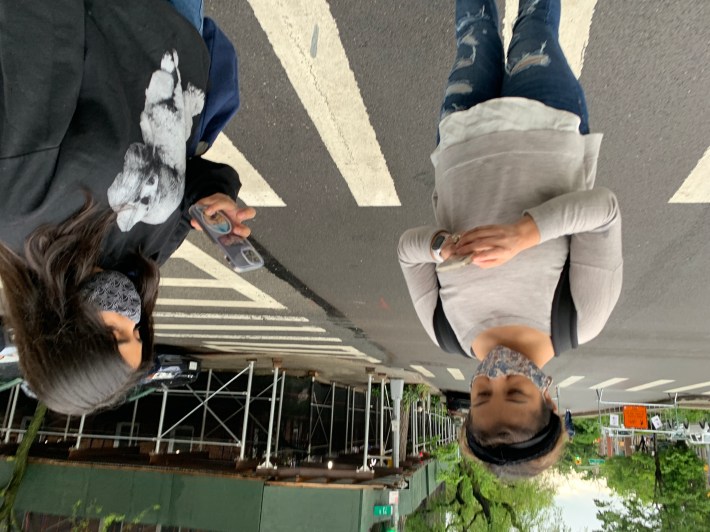
The other day, Streetsblog met Deisy Jara and Ashley Ambrosi, residents of 34th Avenue whose building does not have a fancy backyard or inner courtyard, nor does their household have access to a car. Both were eager to sign the petition calling for a linear park.
“Before the open street, it was all cars and pollution in my face," Jara told Streetsblog. "This is great.” She could not believe that some of her neighbors want to take the public roadway away from the people so that it remains available for the storage of privately owned vehicles.
But Jara and Ambrosi are certainly not alone in their support for permanent open streets.
New Yorkers of all races and income levels tell pollsters that their lives are better when car traffic is reduced around them. For instance, in a recent survey commissioned by Streetsblog from the respected polling firm Data for Progress, we learned the following:
- 67 percent of voters said the city was right to close some roadways to traffic to create space for restaurants and people. The support was strong across the board:
- 66 percent of voters making less than $50,000 and 67 percent of voters making more than $150,000 agreed.
- 64 percent of Latino voters agreed (versus only 23 percent who didn't)
- The support was also strong in all age groups.
- 72 percent of voters say they prefer "livable streets that prioritize people's needs and their safety."
- The number rose to 77 percent among Black or African-American voters.
- And 72 percent of voters support livable streets in all income levels.
What is even more interesting is the racial breakdown of that survey. The overwhelming majority of voters who identified themselves as Latino or Hispanic support open streets (and, indeed, a majority — nearly 58 percent — of the people who live in Census blocks that straddle 34th Avenue identify as Hispanic or Latino). No matter how Streetsblog asked the question, we received largely the same answer from these voters, as the charts below show:
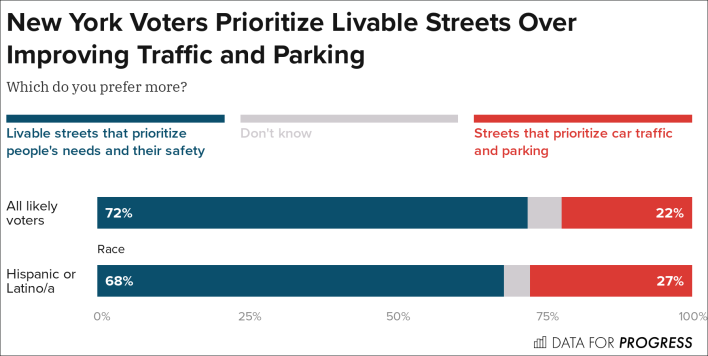
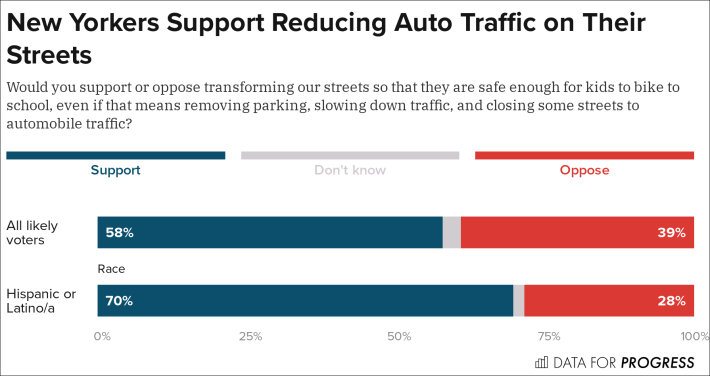
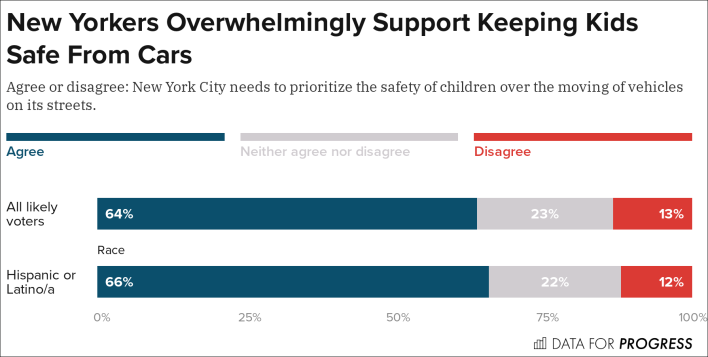
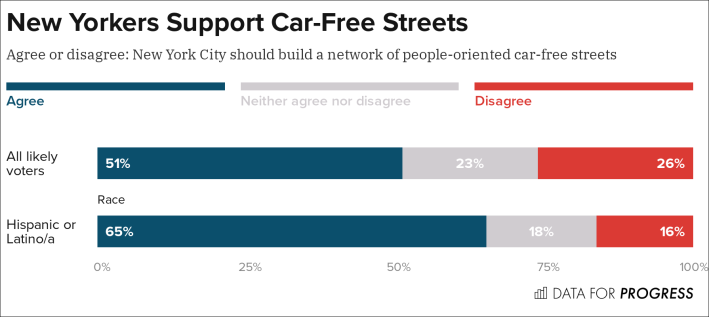
It's not as if the mayor and the city's political establishment doesn't support open streets. The question on the floor — or, literally, on the street on Saturday — is simply how much. We asked Mayor de Blasio about whether 34th Avenue could be a great test case for a Barcelona "super-block"-style 5-mile-per-hour slow zone, and he said it was "worth looking at."
And then he got wistful about how great cities can be when they remove cars, evoking his Italian heritage and his frequent vacations in his ancestral land.
"I was very struck by how [near] my ancestral hometown and Napoli, how they closed off waterfront roads in a really productive way," he said. "I do think it's going to be a bigger part of our future. I really do."
He then turned to his health commissioner, Dr. Dave Chokshi, who revealed not only that car-free streets are simply safer and healthier, but that he has first-hand experience.
"I've enjoyed the open streets in my neighborhood of Jackson Heights in Queens, and I do think that [Streetsblog is] right to connect it to health," he said. "We have to think about all of the benefits that people get from congregating outside. There are social benefits. There are the benefits, of course, of promoting a more physical activity, getting people out and walking as well. And so, we have to take that very holistic approach in thinking about the links between our transportation infrastructure and health."
— with Julianne Cuba
Gersh Kuntzman is editor in chief of Streetsblog NYC and Streetsblog USA. He also writes the Cycle of Rage column, which is archived here.
Stay in touch
Sign up for our free newsletter
More from Streetsblog New York City
Stockholm Leader’s Message to NYC: ‘Congestion Pricing Just Works’
"In Stockholm, people really thought that congestion pricing would be the end of the world, the city will come to a standstill, no one would be able to get to work anymore and all the theaters and shops would just go bankrupt. None of that happened."
Friday’s Headlines: Trump Trial Trumps Safety Edition
Is anyone going to bother to fix the dangerous mess on the streets and plazas around the Trump trial? Plus more news.
Adams Offers Bare Minimum to Seize Congestion Pricing’s ‘Space Dividend’ Opportunity
The mayor's list of projects supposedly meant to harness congestion pricing's expected reduction in traffic is mostly old news, according to critics.
OPINION: Congestion Pricing Will Help My Family Get Around As We Navigate Cancer Treatment
My partner was recently diagnosed with cancer. Congestion pricing will make getting her to treatment faster and easier.

